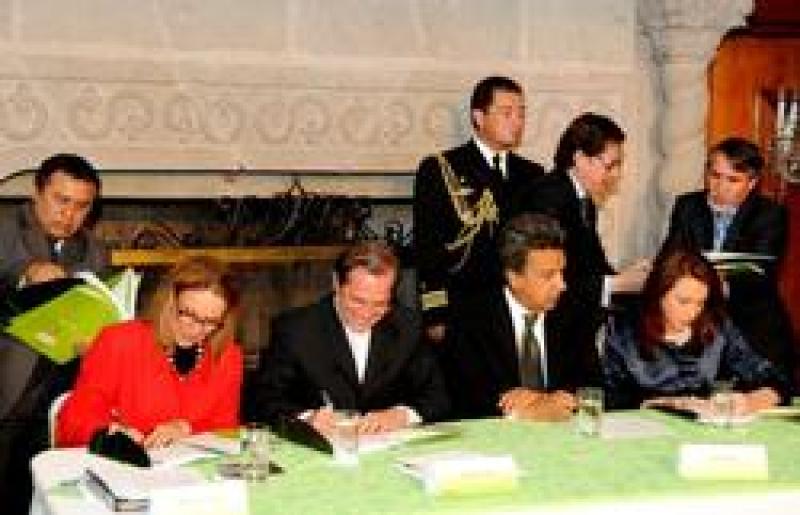

The Government of Ecuador and the United Nations Development Programme (UNDP) signed a historic deal establishing a trust fund to step up protection of an ecological site in an oil-rich area of the Ecuadorian Amazon.
The Government of Ecuador and the United Nations Development Programme (UNDP) signed a historic deal establishing a trust fund to step up protection of an ecological site in an oil-rich area of the Ecuadorian Amazon.
The agreement - signed on 3 August 2010 in Quito by Ecuador’s Foreign Minister Ricardo Patiño and by Rebeca Grynspan, UN Under-Secretary-General and UNDP Associate Administrator, with Ecuador’s Vice President Lenín Moreno and the Coordinating Minister of Patrimony, Maria Fernanda Espinosa, signing as witnesses of honor - establishes the commitment to leave an estimated 846 million barrels of crude oil lying under the Yasuní National Park, a World Biosphere Reserve designated by UNESCO since 1989.
“We still have to collect the funds for the initiative to become a reality,” said Ecuador’s Vice-President Lenín Moreno. “We need industrialized countries to understand, in a spirit of shared responsibility, that what we have decided this historic morning is a sacrifice for our country.” UNDP Associate Administrator Rebecca Grynspan, said, "We are witnessing the inauguration of new instruments of cooperation which will act as a basis for supporting other national and international efforts directed towards the search for economies that are in harmony with society, nature and the planet."
President Rafael Correa's vision and historical decision to permanently forego the extraction of the Yasuni ITT oil fields is unprecedented in the history of an oil-dependent country. The oil fields in Yasuni ITT (846 million barrels of crude oil) represent 20 percent of the Ecuador’s oil reserves. This historic decision will avoid the emission of 407 million metric tons of Carbon Dioxide (CO2) which would result from burning fossil fuels, protect one of most bio-diverse regions of the world and maintain the livelihoods of the area's indigenous people.
Ecuador, home of the Galapagos Islands, the Andes mountain range and vast tracts of oil-rich rainforest, is forgoing the income from the oil extraction in the Ishpingo-Tiputini-Tambococha field of the Yasuni National Park amounting to US$ 7.2 billion. It is requesting the world community to compensate $3.6 billion, with the $3.6 balance being the first major contribution of the people of Ecuador.
The Ecuador Yasuni ITT Trust Fund will combat climate change, protect biodiversity and the rights and cultures of its indigenous people through protecting Ecuador's national protected areas, developing renewable energy sources, and expanding social services to affected areas.
The Yasuni National Park is known for its extraordinary biodiversity. The park covers 982,000 hectares and is located in the Upper Napo valley in the Western Amazon region of Ecuador. It has an over 2,200 tree and bush species, with over 600 species counted in just one hectare: more than the total number of native tree species in the United States and Canada. Yasuni has around 600 recorded bird species, making it one of the world’s most diverse avian sites. There are 150 amphibian and 120 reptile species as well as 4000 vascular plant species per million hectares. The number of insects is estimated to be 100,000 species per hectare, the highest concentration on the planet. Yasuni National Park is home to the Tagaeri-Taromenane, indigenous peoples living in voluntary isolation.